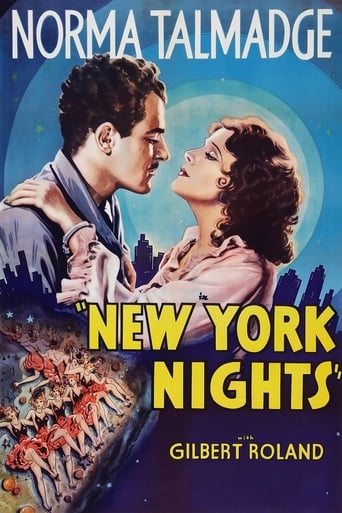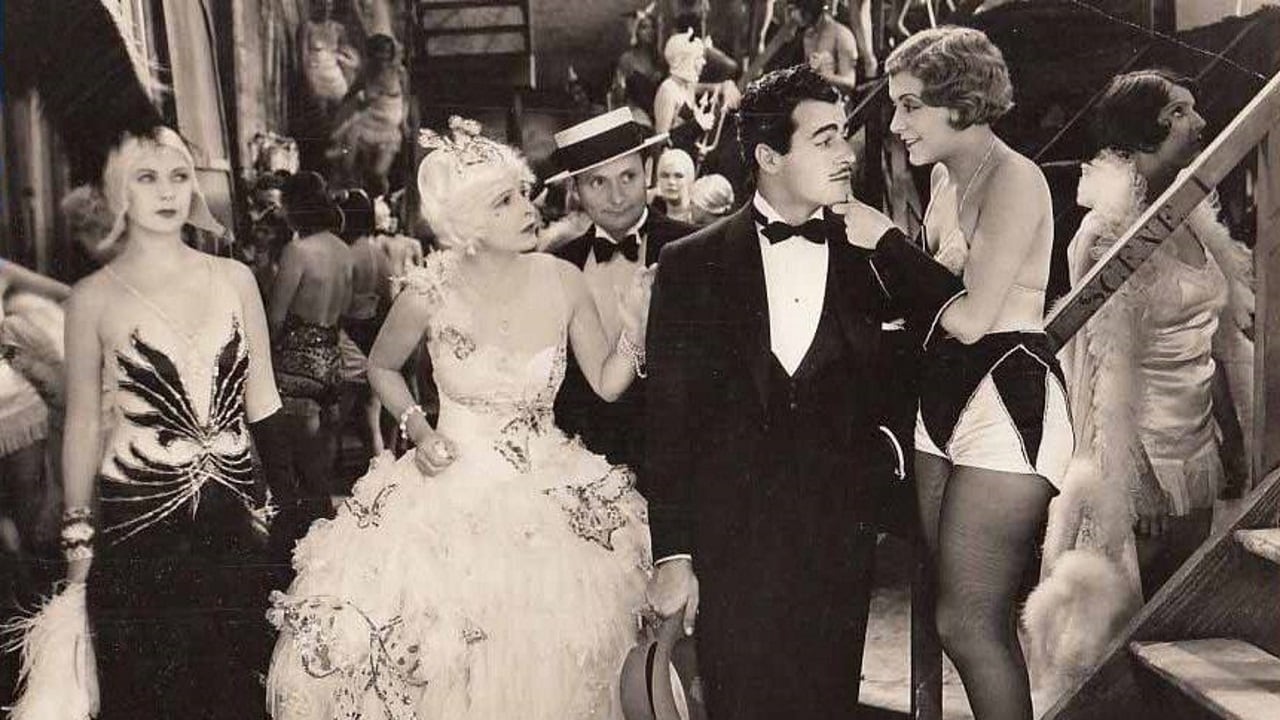boblipton
This is one movie from 1929 that does not deserve the bad reputation it has. Norma Talmadge's voice is fine. Her performance in this remind me of Clara Bow, and director Lewis Milestone throws a costume party for the demi-mondaine that strikes me as something that human beings out for a good time with the rough crowd might go to for: free food and booze -- one at which the neighbors call the cops at 2AM instead of waiting for lightning to set the dirigible on fire a la DeMille.The story is a little flat and predictable for 1929: showgirl Talmadge throws out songwriter-husband Gilbert Roland after he turns up drunk one time too many and takes up with visiting Chicago hood John Wray, who's crazy for her, but she can't help loving the big sap of a hubby.There's lots of good stuff, from proto-noir lighting and some nice moving shots by cameraman Ray June, some fine editing by Hal Kern and good acting all around. So why the lack of interest? I think Miss Talmadge was in her mid-thirties, thought that film-making was getting too complicated, she wasn't getting any younger, and she didn't need the money. She and her sister Constance owned a big chunk of San Diego, anyway.
mark.waltz
When Gilbert Roland uses the word chink to describe a Chinese waiter, it's almost so shocking you're not sure you actually heard right. Fortunately, there are no other racial slurs in this predictable and creaky melodrama where Gilbert Roland's infidelities cause the end of his marriage to Norma Talmadge. She ends up involved with a dangerous gangster millionaire who threatens violence when Roland returns. Supporting performances by Roscne Karnes and Lilyan Tashman outshine the leads. A few musical interludes help establish the Broadway nightclub atmosphere and end up being quite welcome considering the surprising lack of humor.
calvinnme
This was silent drama star Norma Talmadge's talkie debut, and it flopped at the box office. However, for the life of me, I cannot figure out why. Legend has it that Singin in the Rain's Lena Lamont was modeled after Norma, but I have to tell you that I really couldn't detect much of a New York accent in her voice, and her speaking was perfectly fine. She also seemed to understand how to integrate speaking and acting into a cohesive whole. Gilbert Roland was a bit hammy, but if you look at his performances just a couple of years later he improved very rapidly. In fact, the worst performance here - and it's really not that bad - is John Wray as the gangster that is after Norma's character. He plays it way over the top yet he had plenty of roles in talking films for years to come.The story is pretty routine - Jill Deverne (Norma Talmadge)is married to Fred (Gilbert Roland), a struggling songwriter. Their domestic happiness is threatened by a gangster who is interested in Norma and by a chorus girl who is interested in Fred. Lilyan Tashman plays Jill's friend and does a great job with the catty lines as she stands up for Jill.The only thing I can figure about the original failure of this film is that people had a certain idea about their silent stars and, for the most part, giving them a voice just took away the magic and made them seek out new faces - Cagney, Blondell, Tracy, and Hepburn among others. Very few weathered the transition and Norma Talmadge was among the many casualties. If you're a fan of the early talkies I recommend you check this one out if you get the chance. It's a rare opportunity to see Norma Talmadge in a film since so very few of her silent films survive. That's too bad since she was one of the most popular dramatic actresses of the silent era.
arthursward
A police wagon speeds through pre-dawn Manhattan streets as the credits roll. The siren screams, there is no music. Two policemen rouse a doctor to a stricken man, he's dying. "Who did it, Dopie?" Cut to a tuxedoed silk hat in the back of a chauffered limo. "Gee, boss, that was a nervy hit." An I. O. U. for $25,000 payable to Dopie Brown is being torn, "Somebody's always gotta pay for a fourflush." A cackling John Wray (as Joe Prividi) chews the I. O. U. pieces into a spitwad, then flings it out the window. Joe then breaks into a flower shop and takes a stolen bouquet to "his goil".Norma Talmadge as Jill Deverne is the object of Joe's affections. Leaning into a clever two shot in a dumbwaiter, she reminds her Broadway show's producer that her husband might object. Jill walks the knife edge between offending her benefactor and encouraging his romantic inclinations. She is polite, yet firm. In another room, her husband, Fred (Gilbert Roland) works on a tune with buddy, Johnny (Roscoe Karnes). Fred's stuck for a closing lyric and Jill enters with a plum, then falls into his arms. In one scene, Gilbert Roland and Norma Talmadge exhibit their fine voices and sparkling, well-honed chemistry. Roland and Talmadge had been teamed in THE DOVE (1927) and A WOMAN DISPUTED (1928) and here, the magic pops out of the screen. Norma has several close-ups that display her acting mastery. Halfway through the first reel you'll be in love with this movie.Lilyan Tashman, as Jill's friend Peggy, has a backstage scene where her beauty is truly revealed. With her hair hidden by a cloche-like headpiece, Ms. Tashman's face is revealed to be the most beautiful ever photographed. Also revealed, in this pre-code picture, is her body. Were it not for the wings of a bird seemingly painted on Lilyan's front, all of her modesty would be lost.The direction is excellent, tightly handled by Lewis Milestone right before he started ALL QUIET ON THE WESTERN FRONT. The pace is rapid and only relents for one brief reconciliation between Jill and Fred. They plot their getaway in a booth in a diner. As they hash out the final details, the camera dollies slowly to the next booth, chillingly revealing Joe's chauffer eavesdropping.Ray June keeps interesting shots coming throughout the 64 minutes my print ran. And this is where a discrepency arises. The runtime is given as 108 minutes (IMBD), then a release footage of (approx.) 7380 ft (IMDB). AFI lists the release footage at 7447. As both footages run 81 or 82 mins, one wonders what happened to the rest of the film. [I know film shrinks, but that's rediculous] I can find only evidence of one song ever having been in the picture.73 years after its release, it is impossible to determine what sank this wonderful film at the box office. But, sank it did. Impossible to ascertain whether it failed to be promoted, what the rumor mill ground out or just how the public expected silent film stars to sound. After one more picture, the glittering career of Norma Talmadge, a star that shone so bright as to bring two sisters into the arc light, would be extinguished. Only a year later, as writer Joseph L. Mankiewicz noted, the end of the silent era was typified by Norma Talmadge leaving the Brown Derby and telling a gang of autograph hounds, "Get away, you little b*****ds, I don't need you anymore." And thus fell silent a splendid, promising new talking picture career.At least we have this terrific movie to remind us of how good silent film technique could be in talkies.


 AD
AD


